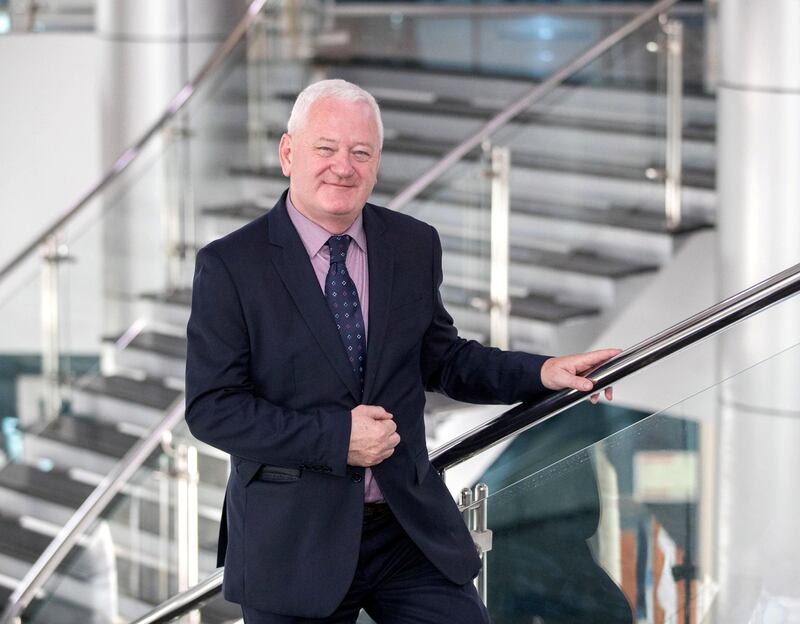Boosting the number of Emiratis studying science is a priority for Khalifa University as the UAE strives to build a knowledge and innovation economy.
New science degrees are also in the pipeline as the educational institute seeks to become a world-class research-led university.
Among those driving this push is Professor David Sheehan, interim dean of the college of arts and sciences. At NYUAD on Monday he will deliver a talk titled "science and knowledge economy: Ireland as a model for UAE". It will offer a personal view of how his home country managed to transform its agrarian economy to one focused on innovation, science and research.
Prof Sheehan joined Khalifa University of Science and Technology last year from University College Cork in Ireland.
Khalifa University currently has three bachelor of science degrees in chemistry, maths and geoscience and it's hoped to expand degrees offered to physics, computer science and molecular biology. "I'm trying to build a set of bachelor of science degrees in fundamental sciences and the difficulty is recruiting students," he said.
_______________
Read more:
Khalifa University ranked among Asia's best after merger of Abu Dhabi institutions
A strong focus on science is the key to innovation
_______________
"It's a big challenge. It's a marketing and cultural challenge and that's part of the reason I'm doing this talk — to tell the public of how important science is going to be to their lives."
Ireland in the 1960s was a poor country where hundreds of thousands emigrated. Today the country is the fastest growing economy in the European Union for the fourth year in a row. Nine of the world's top-ten pharmaceutical companies are based there, lured by a competitive tax rate but also by a trained, English-speaking workforce and commitment to research and development where companies can grow.
"These companies ask two questions. Where is the nearest airport and where is the best university?" said Prof Sheehan, who was headhunted for the job at Khalifa. "They want to be near the human and intellectual capital. There are great opportunities in this country for that."
Given that many children today will work in industries that don't even exist yet, research is important especially in sectors such as material science, medical devices, pharmaceuticals, IT, robotics and nano-science. "That's where knowledge is, not manufacturing," said Prof Sheehan. "Don't assemble, but develop new products." In this way, factories won't ship off to other countries to save money.
The priority now is increasing the numbers of Emiratis studying physics, chemistry and molecular biology. More than 3,000 students attend Khalifa, about 80 per cent are Emirati yet the vast majority study engineering. In western universities, it's the complete opposite with sciences much more popular. This lopsided focus on engineering is similar across the GCC because of the oil and gas heritage but it needs to be changed. "Engineering is good for tweaking and improving but the fundamental advances tend to come from science."
Prof Sheehan also points to Singapore and South Korea, who along with Ireland, have made the journey to a knowledge economy. "Their industries revolve around pharma, biomedical devices, IT and robotics. These have a large element of fundamental science."
While tax breaks are important, there are three main ways to becoming a knowledge economy: education, diversification and putting more resources into chemistry, physics and biology. The UAE also should not worry too much about making mistakes. In Ireland, money was spent on research institutes that were building-based which were not successful. It was only in 2001 when the Science Foundation Ireland (SFI) was established that the country found success. "The SFI was amazingly successful. Small companies came from it and then indigenous companies.
"I recognise the landscape here, the UAE is on a similar journey to Ireland. We've made that journey and if the [UAE] can do some of the same things … then they perhaps can make the journey a bit quicker."
Lots of hard work lies ahead and Prof Sheehan will take people through his four-decade journey on Monday. But so far, he has been impressed by the calibre of students, the faculty at Khalifa and, being married with three children, the family-friendly nature of Abu Dhabi.
"Khalifa is a wonderful place to work — the amazing thing is the international outlook. The students are so into it."
Khalifa University, Masdar Institute and the Petroleum Institute were merged in 2016 and the institution surged to 32 out of 359 universities according to the Times Higher Education Asia University 2018 Rankings.
Science and knowledge economy: Ireland as a model for UAE takes place at NYUAD at 6:30pm on Monday







